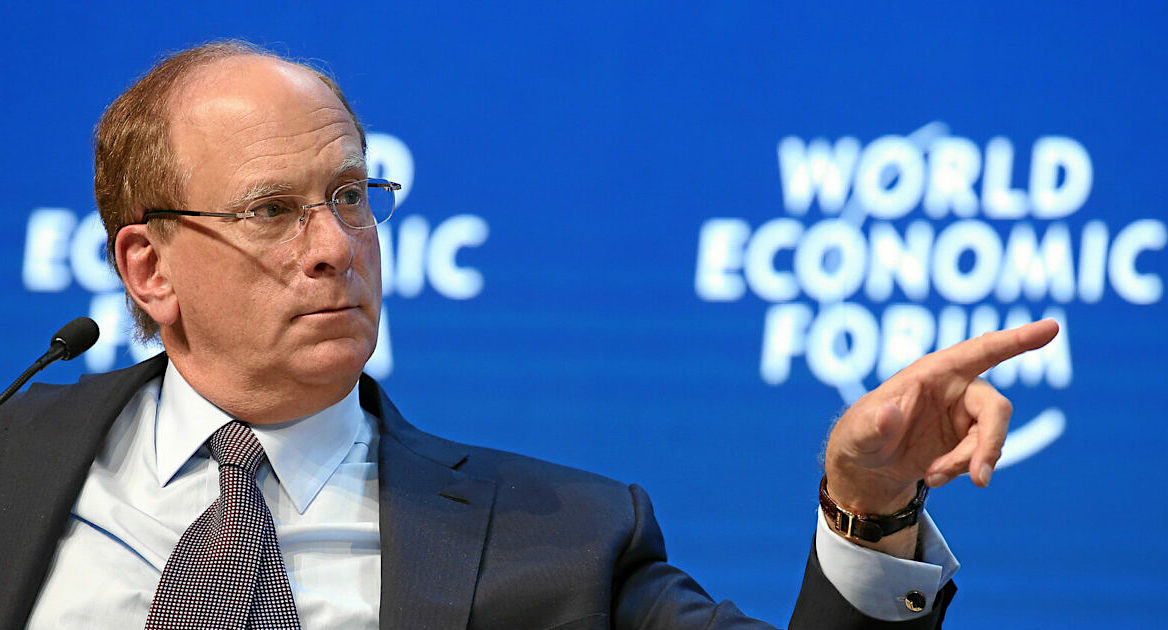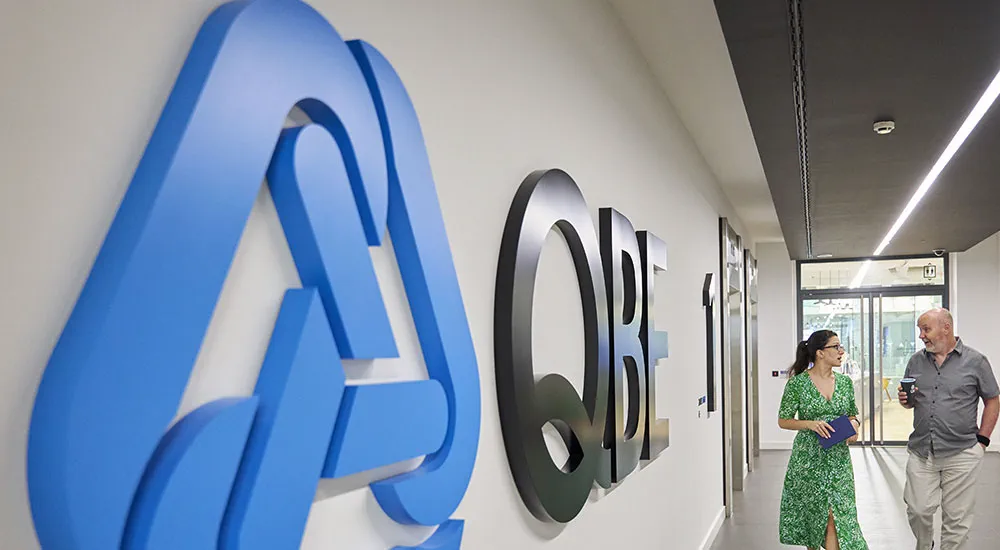ImpactAlpha, March 16 – Don’t expect BlackRock to back off from ESG any time soon. Even if the acronym appears nowhere in chairman Larry Fink’s latest annual letter to investors.
BlackRock’s bottom line makes clear that ESG is good for business.
That Fink – the embodiment of “woke capitalism” for critics on the right, and of business-as-usual for critics on the left who lampoon BlackRocks’ continued financing of such non-ESG friendly sectors as the fossil fuel industry – takes such pains to not directly use the phrase shows just how toxic things have gotten.
But the ongoing embrace by the world’s largest asset manager of environmental protection, social responsibility, and corporate governance with regards to capital markets and business is apparent in almost everything Fink says. Fink and BlackRock, as the world’s largest provider of indexed funds, see a lot of opportunity in ESG.
For the past decade, starting in 2012, it has been Fink’s practice to write a letter to CEOs preceding the investor letter, invariably telling them to be good corporate citizens. Pundits have noticed that while Fink typically publishes his CEO letter in January, he has yet to produce one for 2023. Could it be that the BlackRock CEO has had enough of encouraging his fellow C-Suite leaders to lean into good ESG practices?
Speaking to Bloomberg TV in January from the sidelines of Davos – that gathering of the great and the greater – Fink lamented that the attacks had gotten personal. “It’s hard, because it’s not business any more. They are doing it in a personal way. For the first time in my professional career, attacks are now personal. They’re trying to demonize the issues.”
This weekend, the state treasurer of Utah, one of the red state elected officials who has been a leading voice criticizing ESG, delivered remarks at the Salt Lake County Republican Party Convention. He called ESG part of “Satan’s plan.”
Florida’s Gov. Ron DeSantis blamed the failure of Silicon Valley Bank on “woke capitalism” and diversity – as opposed to, you know, greed, shitty risk management and poor regulatory oversight. It looks like ESG is going to continue to be a popular punching bag for any and every politically ambitious Republican candidate for this election cycle and beyond.
So you can forgive Fink, once such a vocal proponent, for being reticent to utter the letters “ESG.” But that doesn’t mean he’s not talking about it.
Fiduciary duty
Fink spends a considerable portion of this year’s Chairman’s letter implicitly, if not explicitly, defending New York-based BlackRock’s record when it comes to taking a generally ESG-friendly approach to asset management.
He used pretty much the same language as he did on the most recent analyst call for the publicly traded asset management firm: BlackRock, with $8.6 trillion in assets under management, is first and foremost a fiduciary. “We manage money on behalf of our clients to help them or the people they serve achieve their financial goals, including saving for retirement, a home, or a child’s education,” he explained.
Fink goes on to say that it is “a huge source of pride” knowing BlackRock is helping firefighters and teachers “retire with dignity after a lifetime of service,” and helping families “take some of the stress out of paying for college.” He skips over the part about Saudi sovereign assets, but there’s only so much you can cram into one CEO letter – or column.
An important part of BlackRock’s fiduciary duty, as Fink makes clear in his letter, is “to identify short- and long-term trends in the global economy that might affect our clients’ investments. We do this across all sectors, including those that are essential to the future of the economy such as healthcare, technology and energy.”
Fink is making the point to fire and police and other public pension plans that might not agree for political and ideological reasons with ESG that BlackRock is exploring areas like renewable energy and sustainability because these are important long-term trends for the economy. Not because a bunch of left-leaning activists hate the fossil fuel industry and want to see it dead.
Continuing with his theme, Fink says that BlackRock’s clients are long-term investors. “We evaluate all kinds of long-term investment risks that could impact their portfolios – such as inflation, geopolitics, or the energy transition.”
Climate risk and proxy voting
Fink explains BlackRock’s interest in the clean energy transition by identifying the climate crisis as both a source of macro economic risk and an opportunity for investment and innovation. Sustainability risk factors, such as carbon emissions, are material, after all. BlackRock’s job is to “think through and model different scenarios to understand implications for our clients’ portfolios.”
That is why, Fink says, he gives those poor CEO’s such a hard time, “advocating for disclosures and asking questions about how companies plan to navigate the energy transition.” As minority shareholders, it’s not BlackRock’s place to tell companies what to do, he says, “My letters to CEOs are written with a single goal: to ensure companies are going to generate durable, long-term investment returns for our clients.”
It’s all about the money, honey. Oh, and the dignity.
BlackRock sees another money-making opportunity in corporate governance. Voting Choice is a new initiative that BlackRock has rolled out which enables clients to vote their own proxies. BlackRock clients representing $500 billion in assets under management already use Voting Choice.
Some clients “have expressed interest in a more direct role in the stewardship of their capital, and we have sought to deliver solutions that enable them to vote their shares,” Fink wrote. If widely adopted, he says, “Voting choice can enhance corporate governance by bringing new voices into shareholder democracy.”
On the one hand, this looks like a nifty new way for BlackRock to retain client assets. On the other, isn’t this like having your cake and eating it, too?
If BlackRock thinks that sustainability is such a good thing, presumably this extends to proxy voting (Fink has a whole long bit on BlackRock’s stewardship program). Surely, BlackRock should want its clients to vote their proxies in the most prudent manner possible? In other words, whatever way BlackRock is voting. After all, they’re a fiduciary.
But Voting Choice means that if a client disagrees with the firms – if they think BlackRock is being too woke or not woke enough – they can, in certain circumstances (this doesn’t apply to all portfolios), opt out.
This isn’t going to be enough to stop angry politicians from raging against BlackRock – the fight, after all, is the point – but you can see how this might be attractive to core investor groups. A family office or an endowment that is concerned about climate change, for example. Or even union pension plans that want to see the adoption of more labor friendly policies, or have views on executive compensation they believe to be excessive.
Inflows vs. outflows
Fink’s, and BlackRock’s pro-ESG agenda doesn’t appear to be hurting the firm’s business very much, if at all.
Sure, if I was the firm’s institutional salesperson for the southeast or southwest regions of the U.S. I might be pissed off (and maybe looking for a job elsewhere). But overall, not so much.
And when it comes to the global picture it appears the firm is betting that being pro-ESG is a better bet – and leads to more inflows – than being anti-ESG. Otherwise someone would have told Fink to shut up a long time ago (to be fair, few predicted the anti-ESG backlash would blow up quite as big as it did). I’m not sure anyone tells Fink to shut up, but you never know.
True, BlackRock has experienced billions of dollars in redemptions from pension plans and other entities in red states that have passed legislation barring public pensions and other state entities from doing business with asset managers that are supportive of ESG. Legislation is on top in dozens of states.
As Institutional Investor wrote in a recent article on the ESG blackash, “BlackRock has pushed companies to take sustainability seriously, and at least six red states have already pulled more than $4 billion from the money management giant.” States that have pulled money from BlackRock include Florida, South Carolina, Louisiana, Missouri, and, yes, Utah. Last August, 19 state attorneys general signed a letter to BlackRock telling the firm to knock it off with the ESG stuff.
But, as Institutional Investor points out, some states have started to push back. In February, the Kentucky County Employees Retirement System wrote to Kentucky State Treasurer Allison Ball that her requirement that the pension fund divest from companies her office deemed as boycotting the energy sector — including BlackRock, JPMorgan Chase & Co., and Citigroup, among others — was “inconsistent” with the pension’s fiduciary obligations.”
Anti-ESG bills in Indiana, Kansas and Wyoming have sparked similar pushback. An Indiana bill that would prohibit public pension funds from using ESG funds or firms would cost nearly $7 billion over the next decade, according to the state’s Legislative Services Agency Office of Fiscal and Management Analysis.
BlackRock’s overall inflows do not seem to be suffering. In his Bloomberg interview at Davos, Fink pointed out the firm lost about $4 billion from ESG-related redemptions in 2022, but saw inflows of around $400 billion, including $230 billion in the U.S.
BlackRock continues to seek to diversify its business beyond public pension plans and other institutional investors, both inside and outside the U.S. And for many of these clients, particularly in Europe ESG is important. European regulation encourages asset managers to consider ESG factors.
For any manager, not just BlackRock, as they seek to build a bigger and more diverse investor base they can care less about not investing the pension assets of, say, Florida’s firefighters and teachers. (For governance reasons, Beth Ford resigned from BlackRock’s board after her wife became CIO of the Minnesota State Board of Investment.)
Sure, it would be nice to have that pension business. But these large asset management firms are not beholden to public pension business in the way they once were.
BlackRock, which operates an ETF juggernaut in iShares, continues to manage one of the world’s largest ESG ETF businesses. The challenges to that business go beyond a bunch of state treasurers blowing smoke. Last November, BlackRock had to reclassify $26 billion in ESG ETFs in order to comply with EU regulations.
Never enough
All of which is not to say that BlackRock’s record and sustainability and stewardship meets expectations on the left. The firm continues to be one of the largest shareholders of fossil fuel companies and, indeed, BlackRock has made clear to states that are boycotting it (looking at you Texas) that they are still investors in the industry.
Shortly after Fink’s letter to investors hit the tape yesterday, I received an email from Majority Action, a shareholder rights group focused on corporate accountability, which slammed BlackRock’s proxy voting. BlackRock’s track record “consistently shows its failure to address the biggest systemic risks facing long-term investors.”
Majority Action criticized BlackRock’s votes in favor of board of directors at “misaligned climate companies,” and calculated its support of racial equity audit proposals fell to 52.6% last year, from 87.5% in 2021.
And Majority Action suggested that the firm’s Voting Choice initiative is a cop-out.
Poor Larry, he just can’t win. Or can he? BlackRock will continue to walk the line on ESG, never satisfying its critics on the left or the right, but making money all the same.
ESG is big business for BlackRock, even if Fink won’t call it by its name. At least, not right now.











